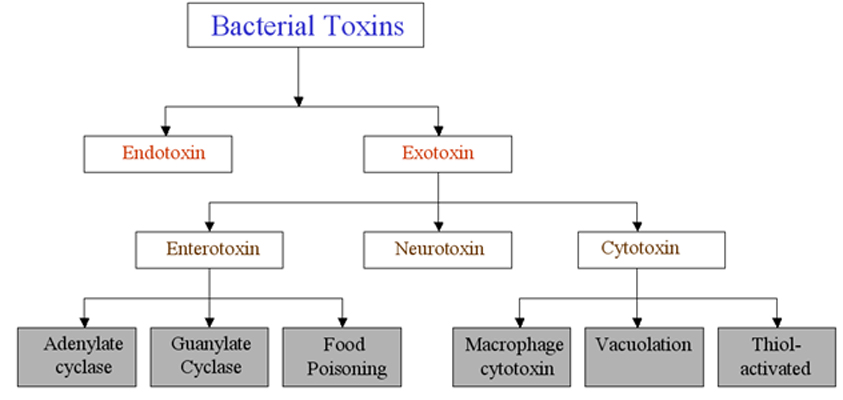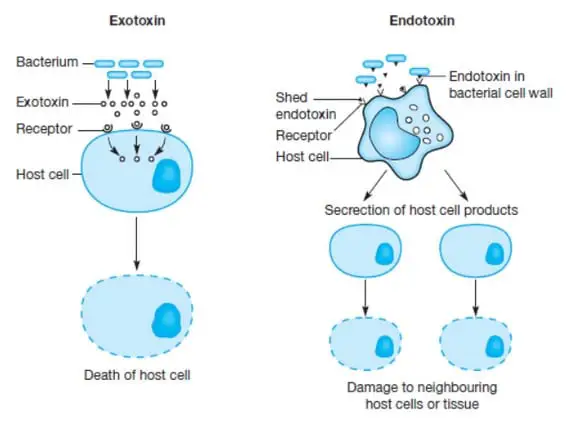Bacteria Toxins
Toxins-
Bacteria produce toxins or poisonous substances by their growth. Toxins are complex proteins or substances much like proteins. There are two types of toxins namely exotoxins and endotoxins. Some bacteria form both exotoxins as well as endotoxins. We will now focus on these two types of toxins.
- Exotoxins
- Endotoxins
- Specificity of Toxins

Exotoxins-
An exotoxin can cause damage to the host by destroying cells or disrupting normal cellular metabolism. They are highly potent and can cause major damage to the host. Exotoxins may be secreted, or, similar to endotoxins, may be released during lysis of the cell.
Exotoxins are generally produced by Gram positive bacteria and excreted into their surroundings, e.g. Shigella dysenteriae. Cholera vibrio; Corynebacterium diphtheria. Clostridium tetani. Clostridium Walachia. Exotoxins are unstable and usually destroyed by a temperature above 65 ° C. They are highly antigenic and produce neutralizing antitoxins.
Endotoxins-
Endotoxins are produced chiefly by Gram negative bacteria and remain confined within the body of bacteria and not excreted into their surroundings. They are freed only when the bacteria are broken down. They are less toxic than exotoxins. They are weakly antigenic and have no enzymatic action. They are heat stable and can withstand boiling water for a variable period. Endotoxins do not produce neutralizing antitoxins but produce agglutinins, precipitins etc. e.g. Vibro cholerae, Salmonella typhosa, etc.
Differences Between Exotoxins and Endotoxins-
| Exotoxins | Endotoxins |
| Produced usually by Gram-positive bacteria. | Produced chiefly by Gram-negative bacteria. |
| Highly toxic | Weakly toxic. |
| Pass out through cell membrane, i.e. the diffuse into the surrounding medium | Remain enclosed within the cell membrane, i.e. they do not diffuse into the surrounding medium |
| They slowly deteriorate at room temperature. | No deterioration at room temperature. |
| Highly antigenic | Weakly antigenic. |
| Actions neutralised by antibodies. | Neutralising antibodies are not formed. |
| Highly specific for certain tissues or organs | Not specific towards tissues or organs. |
| Very active even in very small doses. | Very large doses are required. |
| Heat labile, destroyed at 65°C | Heat stable, not destroyed even at 100°C. |

Specificity of Toxins-
The toxin of each microorganism is specific and differs chemically from all others.
Examples-
- Diphtheria toxin is an exotoxin and injures kidney, nervous tissue and heart.
- Tetanus toxin also is an exotoxin and injures certain nerves and produces spasms of lock jaw.
- Staphylococci give off several toxins and cause food poisoning.